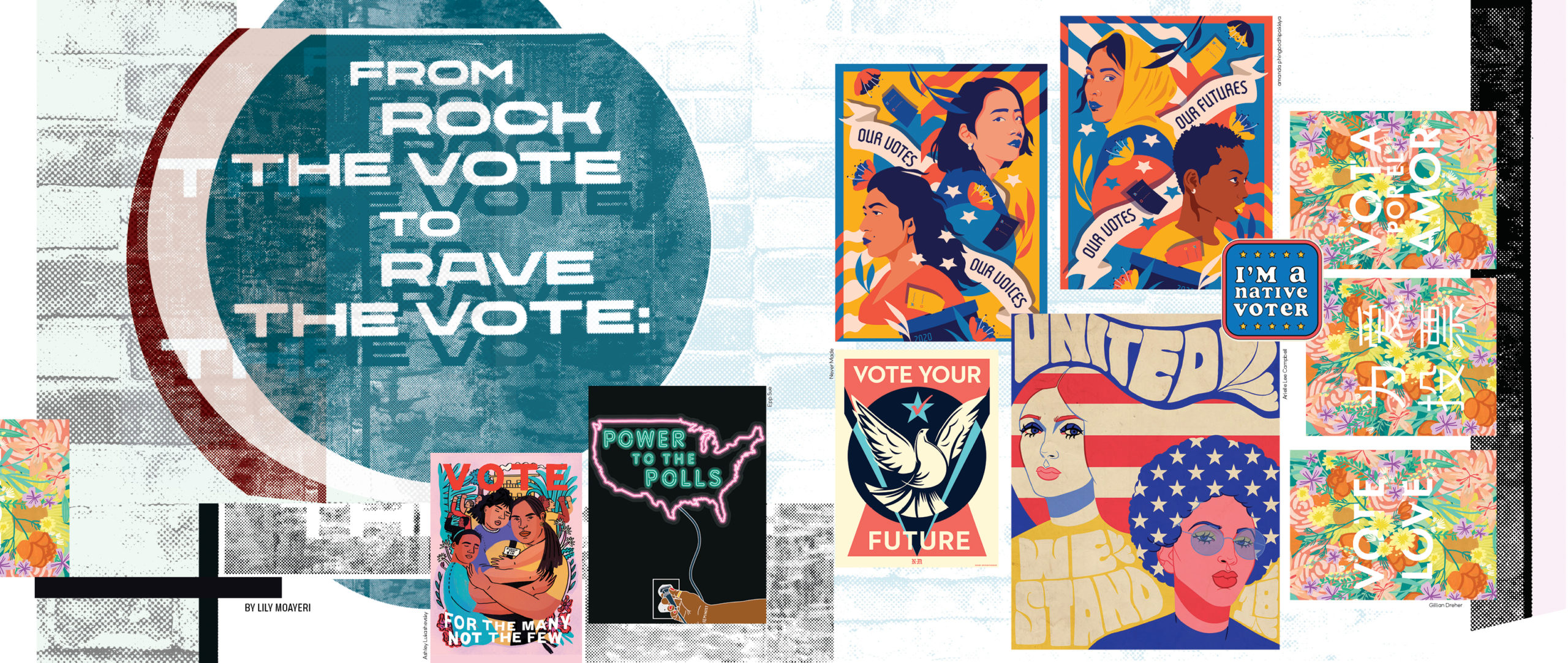This article appears in FLOOD 11: The Action Issue. You can purchase the magazine here. All proceeds benefit NIVA (National Independent Venue Alliance) and their efforts to save independent venues across the United States. #SaveOurStages
Unbelievable as it may seem now, there was once a time when you could broadcast a public service announcement on MTV or VH1 and have it reach 80 percent of the young people in the United States. The first non-partisan, non-profit organization to focus on building the civic and political power of young people, Rock the Vote tapped into the two music networks’ reach from its start in 1990. Founded by music executives as a reaction to the censorship artists like NWA and 2 Live Crew were then experiencing, Rock the Vote garnered a lot of attention thanks to impactful PSAs from its high profile advocates. At the time, having music superstars like Madonna, LL Cool J, Anthony Kiedis of Red Hot Chili Peppers, and Lenny Kravitz speaking about voting was novel and exciting. It fired up young people and made them aware of the importance of voting and representing their interests.
Thirty years later, Rock the Vote’s mission of empowering young people remains the same, but the tactics have taken on a very different look. Adapting with the times, Rock the Vote no longer strictly partners with musicians, but now enlists actors, athletes, journalists, and activists in the cause, and even collaborates with well-known brands in their Brands for Democracy program.
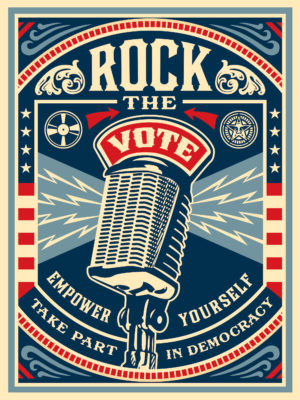
Art by Shepard Fairey
“Social media has completely changed who a celebrity is and who a trusted messenger is,” says Rock the Vote’s president and executive director, Carolyn DeWitt. “Celebrities don’t live in the television, they live on someone’s phone. You can see what they’re thinking and doing all the time. They have platforms to share information about the issues they care about, even what the steps are to voting. In addition to that, because there’s much more information at people’s fingertips through the internet, Gen Z, in particular, is very sophisticated about how they think about the world.”
Rock the Vote is no longer the sole entity of its kind. HeadCount, now arguably the most visible voter registration organization, was founded in 2004 by Andy Bernstein (also a co-founder of National Voter Registration Day) and Marc Brownstein (bassist of the band Disco Biscuits). Originating in the jam band scene, HeadCount established its presence at concerts and festivals with booths where music fans could register to vote. The organization has since expanded to include a multitude of music genres, partnering with everyone from Grouplove and Silversun Pickups to Billie Eilish and Ariana Grande—the latter of whom holds HeadCount’s record for the most voters registered.
“Our bread and butter was going to concerts and festivals,” says HeadCount’s social media and marketing manager, Sarah Frankel. “That’s where we were able to be on the ground and talk to people face-to-face and get them registered to vote. What was really cool about Ariana Grande was, every night, she would post that we were there and where we were. Fans would see this before they entered the arena so they’d be able to find us. They would say, ‘I’m so excited you’re here tonight. I saw you on Instagram. I’ve been waiting to register to vote with HeadCount at an Ariana Grande concert,’ or, ‘It’s my 18th birthday, I saw that Ariana Grande had you guys here and I want to do this right now.’”
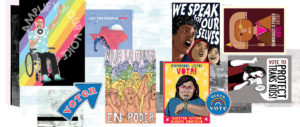
Despite not currently being able to interact with fans at shows due to the pandemic, HeadCount continues its reach to music fans virtually, offering chances for video chats with artists such as Camila Cabello and Sofi Tukker in exchange for checking your voter registration status and registering via text. They have recently partnered with Evanescence for the band’s Use My Voice voter registration campaign, allied with LA-based promoter Insomniac Events’ “CHECK, REGISTER, VOTE” initiative (which targets the dance music community), and hosted “Vote Ready: A Concert for Voter Registration,” a virtual festival with The War on Drugs, Waxahatchee, members of Grizzly Bear and TV on the Radio, and Kevin Morby.
“I used to think voting wasn’t for me. As I’ve gotten older, I see how necessary it is. I encourage anyone who is participating in the presidential election to also stay up on and participate in their local elections.” —Kevin Morby
“I used to think voting wasn’t for me,” says Morby. “As I’ve gotten older, I see how necessary it is. My goal in participating in things like this is to convince anyone that isn’t already convinced, that voting is actually a very important thing to do. I encourage anyone who is participating in the presidential election to also stay up on and participate in their local elections.”
“HeadCount is still doing in-person registration drives all over the country,” says Joe Lester of Silversun Pickups, who had HeadCount on tour with them. “HeadCount, like a lot of other organizations, are the vanguard as far as boots-on-the-ground, person-to-person engagement in getting people to use their voice and their vote to push for the government they want. All of that to say, there’s more work to be done.”
Similar to HeadCount, When We All Vote—launched in 2018 by co-chairs Michelle Obama, Tom Hanks, Faith Hill, Tim McGraw, Janelle Monáe, Chris Paul, and Lin-Manuel Miranda, the non-profit organization—works with a mission statement “to increase participation in every election and close the race and age voting gap by changing the culture around voting, harnessing grassroots energy, and through strategic partnerships to reach every American.” This year, When We All Vote partnered with Lollapalooza for their virtual festival, Lolla2020, cross-promoting on both entities’ sites to encourage voter registration for viewers, powered by Rock the Vote.
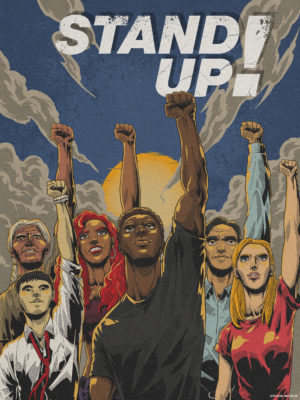
Art by Tres Kiddos
Virtually is the only way Rave the Vote, one of the newest voter activation organizations, has connected with its target audience of electronic dance music fans. The digital event is the brainchild of DJ duo Soul Clap, who originally programmed Rave the Vote as a DJ tour that would hit universities and clubs throughout the Midwest, registering voters using a similar model to HeadCount. But beginning in July, Rave the Vote’s operation shifted to the virtual space, programming monthly twelve-hour events on Twitch. In the process, with the assistance of Infamous PR and 2+2 Management, Rave the Vote has managed to reach up to twenty-four thousand viewers at one time.
Rave the Vote’s informative slide-style social media posts break down voting-related topics applicable to their audience into bite-sized, easy-to-understand morsels. These topics include the importance of the youth vote, voter suppression, local politics, and voting by mail. Rave the Vote’s diverse and heavy-hitting line-up of primarily U.S.-focused artists also reflects its audience. The fact that the audience interacts with the events on their computers makes the transition from typing in the chat to checking registration status and registering to vote a seamless one.
“There are a lot of social media activism ideas floating around,” says Carré Orenstein, Rave the Vote’s executive producer. “Seeing a dance music artist say, ‘We have changes we want to see,’ and start talking about voting, that is a way for the community to get involved on such a low-touch level that everybody can get behind this collective message and spread it pretty wide.”
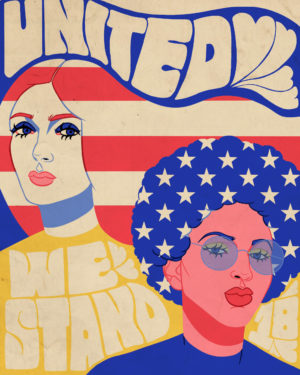
Art by Arielle Lee Campbell
“If you’re not registered to vote, you’re not even part of the conversation,” says Soul Clap’s Charlie Levine. “You can do all the complaining about the current system now, but if you’re not participating, then you’re just blowing hot air.”
“There has been a concerted effort and propaganda to discourage young people from voting for a long time now,” says Levine’s Soul Clap partner Eli Gold. “In dance music, even older folks say, ‘The system is broken, voting doesn’t matter, both the parties suck.’ I don’t know where it started or when, but for most of my adult life, that seems to be a common narrative. It’s so dangerous. It’s giving into this idea we’ve been fed that our votes don’t matter. It’s completely not true.”
“Millennials and voting-eligible Gen Zers comprise nearly 40 percent of the electorate in 2020. If or when young people show up, they have incredible power to determine the direction of our country and our community, and that scares a lot of people.” —Carolyn DeWitt, Rock the Vote
Rock the Vote’s DeWitt concurs that there is a lot of effort to combat the power of young people and prevent them access to the ballot. “Millennials and voting-eligible Gen Zers comprise nearly 40 percent of the electorate in 2020,” she says. “If or when young people show up, they have incredible power to determine the direction of our country and our community, and that scares a lot of people. The disparity between older and younger voters during the 2018 midterm elections was more pronounced. What we saw in the aftermath was that several states and communities started to propose bills moving polling locations off college campuses. They even started questioning the right of college students who were out of state to be voting in that state.”
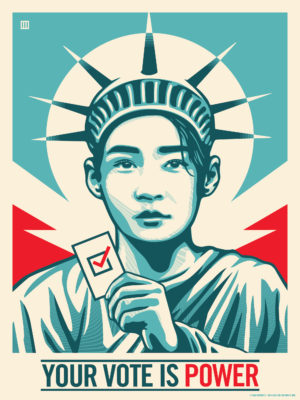
These efforts to disenfranchise younger voters were a big reason why HeadCount expanded beyond its original jam band crowd, and why Rave the Vote is pushing hard to make sure their audience’s voices are considered. Says Gold, “If all the politicians are older and believe their constituencies are older, they’re going to be making decisions based on that. If young people overwhelmingly voted in local elections, there would be very different calculations for decisions being made. Young people don’t vote, so politicians’ decisions and their strategies are around older votes. That’s how they get re-elected.”
“Parties and campaigns spend money on what are deemed ‘reliable voters,’” says DeWitt. “These are people who are most aligned with their values and who are most likely to vote for their party and their candidates. They also spend money on ‘persuadable voters.’ These are most likely to turn out and they can sway if messaged to correctly. Young people, because they do not have an extensive voting record, are deemed ‘unreliable voters’ and therefore campaigns and parties don’t spend money on talking to them. These billions of dollars that are spent on campaigns aren’t used to bring young people into the civic process. The next election, the same thing happens. It has a cyclical effect and a young person, again, doesn’t have a voting record because they weren’t told to vote the last time or even made aware of the issue.”
Tied in with voter registration is voter education—educating them on what they are voting on and how to do it. Rock the Vote and HeadCount include educational information and ballot tools on their sites. Additionally, the voters they register are sent customized texts and/or emails alerting them as to when and what elections are coming up in their area, and where to find information pertaining to that election.
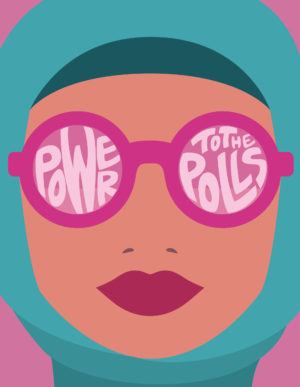
Art by Fara DiNoto
“Voter registration is just the first step,” says Kam Franklin of The Suffers, who sits on HeadCount’s board of directors. “We want our fans to show up to the polls and vote—and not just for presidential elections. The importance of voting in local and state elections is what needs to be amplified right now. The ‘My Ballot’ option on the site includes the ability to see who and what will appear on your ballot in November. If you’re like me and like a bit more time to research candidates, maybe you’ll find it helpful.”
Rave the Vote also understands that younger voters have historically been the least involved and the least vocal about politics, and the most apathetic about voting. At the same time, the dance community is one that is severely affected by elections, particularly on the local level.
“Voter registration is just the first step. We want our fans to show up to the polls and vote—and not just for presidential elections. The importance of voting in local and state elections is what needs to be amplified right now.” —Kam Franklin, The Suffers
“Educating young people on why voting actually does matter is our best way to fight disenfranchisement,” says Gold. “Educating on a local level may be the most important of all, because decisions that are made locally can literally impact what happens in your front yard. The local government is what determines regulations on nightclubs, what clubs can open, where they can open, how late they can be open and how they can look and feel. On that level, it is so important to us because the dance music community is often looked down upon by local governments.”
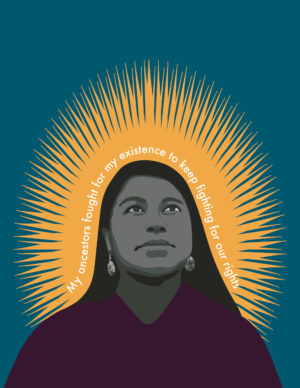
Art by Adriana Arriaga
“It is all too common to feel helpless and become complacent,” says Justin Martin, one of the artists DJing at Rave the Vote events. “What people need to realize is that we can make a difference in our future. The easiest way to do that is to vote for officials we believe in.”
There is a lot of pressure and attention on the younger voters these days, since the younger demographic is diverse, vocal—certainly on social media—and one that calls for change. Registering to vote is one small, but essential, step toward that change, followed by learning about the candidates and issues on their ballot from sources other than social media.
Says DeWitt, “Every youth generation has been told they’re the problem generation, that they’re lazy, they’re apathetic, they’re the problem ones. It’s not particularly a problem of that generation. It’s a problem of our society that we don’t prepare young people to engage with our democracy and to understand the power they have.”
“Noam Chomsky recently brought up this old socialist idea,” says Gold. “It’s not a partisan thing, and it should apply to everybody: Politics is not voting once every four years for president. Politics is every day, actively learning and participating in the things that you care about. That’s what politics is. FL
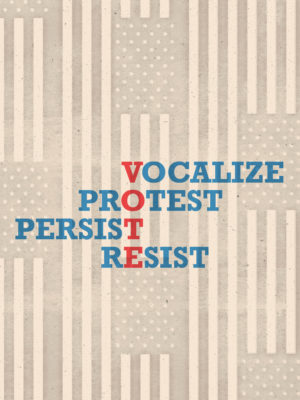
Art by Amanda Sanchez

